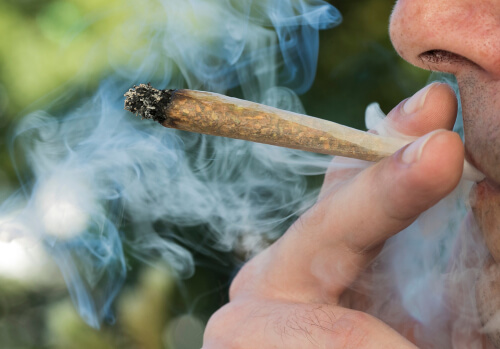Many people believe that marijuana isn’t addictive, but this couldn’t be further from the truth. The National Institute on Drug Abuse estimates that 9 percent of those who use pot will become addicted to it, including 25 to 50 percent of those who smoke daily. About 4.2 of the 6.9 million Americans who abused illegal substances in 2013 also used marijuana.
Marijuana Detox Process
Although the withdrawal symptoms from marijuana aren’t as severe as with heroin or cocaine, they are certainly present and can make the initial stages of quitting difficult. Here are 7 tips meant to help you have a successful marijuana detox:
- Understand Why You’re DetoxingDo you find that you’re unable to stop smoking pot? Do you turn to it when you’re feeling stressed or upset? Has excess pot smoking led to weight gain through the “munchies?” Whatever your reasons are for no longer wanting to smoke pot, write them down and refer to that list when the detox process becomes difficult.
- Eat WellDitch the alcohol and sugar for a diet of lean protein, whole grains, fruits and vegetables. High-fiber and high-water content foods like cucumber, broccoli and beets help in flushing toxins out of your body more quickly as well.
- ExercisePeople who are detoxing often find they have more energy after a few days, but don’t always have an outlet for it. Not only can exercise can give you a place to channel it, but it also helps with flushing marijuana out of your system. As you start to burn fat, the THC stored in your body will move into your bloodstream and eventually out of your system.
- Stay HydratedDrinking lots of water is essential because THC is released from the body through urine and sweat. Certain liquids can even speed up this process further. Try mixing lemon and cinnamon into hot water, or steep cucumber and ginger into your water that you carry around throughout the day.
- Take SupplementsThere’s a reason that pot smokers often use Niacin in an attempt to crash detox before a drug test. Niacin, more commonly known as Vitamin B3, allows toxins to be eliminated more quickly by causing blood capillaries to dilate and triggering the production of histamines. Just one tablet a day before hitting the gym can go a long way.
- Find a Detox BuddyIf you can’t find someone who is also quitting marijuana, rely on a close friend or two who can help you stay accountable. If necessary, a therapist or other health care professional can be immensely helpful for this.
- Go Easy On YourselfThe urge to smoke pot will not go away overnight. Certain people or environments may trigger the urge to use. And now that you’re being forced to regulate your emotions without the help of marijuana, certain things may come up that you’ve been able to avoid for months or even years. Just accept that this is part of the process and will eventually pass if you continue to remain abstinent from smoking pot.
Effects of Marijuana

People have explored many different avenues for how to experience the effects of marijuana. Weed is most commonly smoked in the forms of hand-rolled joints or through pipes. Vaporizers, which reduce the amount of smoke inhaled, are another alternative way of consuming weed. Additionally, there are many recipes out there for ways to bake weed into cookies and brownies, or mix it into butter, tea, and oils. The effects of weed are felt when THC, the active ingredient in marijuana, enters the bloodstream and makes its way into the brain. Some of the symptoms of a high from weed include:
- Increased senses
- Different sense of time
- Feeling humorous
- Relaxation
- Mood changes
- Decreased body movement
- Impaired thinking and memory
When too much weed is consumed at a given time, people can experience hallucinations, delusions, and even psychosis. The effects of weed usually set in after 30 minutes to one hour of ingesting it and can last for a few hours at a time.
NIDA explains that long-term term negative effects of chronic marijuana use are a concern. Particularly when used by teenagers, weed can impair thinking, memory, and important learning functions that form connections in the brain. Researchers are still trying to understand if any sustained long-term damage is caused by marijuana misuse, but they have already observed examples of lowered I Q in adults who used weed since they were young.
How Much THC is in My Body?
There are a handful of factors that will help you determine how much THC and THC-COOH are in your body after any length of time, post-consumption.
- How Often You Consume Marijuana:When determining how much THC is in your system, you must take the frequency of consumption into consideration, first and foremost. Do you smoke once a month, once a week, everyday? When you do smoke, are you only taking one hit or enjoying an entire joint (or two)? Obviously, the more frequently you use (and the actual amount you consume), the more THC and THC-COOH will accrue in the fatty tissue throughout your body.
- Total Body Fat:As we just mentioned, THC and THC-COOH store itself in fat cells, no matter how often or little you use. As a result, the more body fat you have, the more THC and its metabolites will be inevitably stored.
- Metabolism & Overall Health:It makes sense that the healthier you are, the better off you’ll be (in all aspects in life). When it comes to THC and its metabolites, they have less of a chance of storing themselves in your body fat, if there isn’t a lot of body fat in the first place! Having said this, everyone has varying metabolisms that break down THC at different rates. Although exercise can potentially push THC back into your blood stream at a faster rate, this doesn’t mean that you should throw away healthy habits into the wind. Simply maintain a healthy lifestyle and don’t work out too much before a test.
- What Cannabis Products You’re Consuming:Depending on what you consume (flower vs. concentrates) and even the quality of what you consume (top shelf flower vs. schwag) will greatly effect how much THC and THC-COOH are released into your body.
How Long Does THC Stay in My Body?

Typically speaking, psychoactive THC cannabinoids can be found in the system for 1-2 days after consumption for very infrequent users, while those who consume everyday can expect it to remain in their body for longer.
The half-life of THC metabolites is 7 days. Meaning every 7 days, the amount in your body will decrease by 50%.
With this number in mind, most people can assume their body will be clean of THC metabolites within 3-4 weeks – more or less depending on frequency, body weight and amount consumed. If you’re a heavy consumer, it may be best to try an at-home drug test before attempting to pass an important marijuana drug test.
THC is fat soluble and as a result, it gets stored in your fatty lipid tissue. Because of this, your fat cells will secrete THC metabolites into your bloodstream at a constant rate. As a result, many different cleansing techniques are ineffective, as your fat cells will continue to release THC metabolites into your system over time.